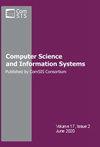Detecting and analyzing fine-grained user roles in social media?
IF 1.2
4区 计算机科学
Q4 COMPUTER SCIENCE, INFORMATION SYSTEMS
引用次数: 0
Abstract
While identifying specific user roles in social media -in particular bots or spammers- has seen significant progress, generic and all-encompassing user role classification remains elusive on the large data sets of today?s social media. Yet, such broad classifications enable a deeper understanding of user interactions and pave the way for longitudinal studies, capturing the evolution of users such as the rise of influencers. Studies of generic roles have been performed predominantly in a small scale, establishing fundamental role definitions, but relying mostly on ad-hoc, data set-dependent rules that need to be carefully hand-tuned. We build on those studies and provide a largely automated, scalable detection of a wide range of roles. Our approach clusters users hierarchically on salient, complementary features such as their actions, their ability to trigger reactions and their network positions. To associate these clusters with roles, we use supervised classifiers: trained on human experts on completely new media, but transferable on related data sets. Furthermore, we employ the combination of samples in order to improve scalability and allow probabilistic assignments of user roles. Our evaluation on Twitter indicates that a) stable and reliable detection of a wide range of roles is possible b) the labeling transfers well as long as the fundamental properties don?t strongly change between data sets and c) the approaches scale well with little need for human intervention.检测和分析社交媒体中的细粒度用户角色?
虽然识别社交媒体中的特定用户角色(特别是机器人或垃圾邮件发送者)已经取得了重大进展,但在今天的大型数据集中,通用和全面的用户角色分类仍然难以捉摸。美国的社交媒体。然而,这种广泛的分类可以更深入地理解用户交互,并为纵向研究铺平道路,捕捉用户的演变,如影响者的崛起。对通用角色的研究主要是在小范围内进行的,建立了基本的角色定义,但主要依赖于需要仔细手动调整的特定的、数据集相关的规则。我们建立在这些研究的基础上,并提供了一个很大程度上自动化的、可扩展的广泛角色检测。我们的方法根据显著的、互补的特征,如他们的行为、他们触发反应的能力和他们的网络位置,对用户进行分层聚类。为了将这些集群与角色关联起来,我们使用监督分类器:在全新媒体上训练人类专家,但在相关数据集上可转移。此外,我们采用样本组合来提高可伸缩性并允许用户角色的概率分配。我们在Twitter上的评估表明,a)稳定可靠地检测广泛的角色是可能的;b)只要基本属性不变,标签就会转移。T在数据集之间变化很大,c)方法的可扩展性很好,几乎不需要人为干预。
本文章由计算机程序翻译,如有差异,请以英文原文为准。
求助全文
约1分钟内获得全文
求助全文
来源期刊

Computer Science and Information Systems
COMPUTER SCIENCE, INFORMATION SYSTEMS-COMPUTER SCIENCE, SOFTWARE ENGINEERING
CiteScore
2.30
自引率
21.40%
发文量
76
审稿时长
7.5 months
期刊介绍:
About the journal
Home page
Contact information
Aims and scope
Indexing information
Editorial policies
ComSIS consortium
Journal boards
Managing board
For authors
Information for contributors
Paper submission
Article submission through OJS
Copyright transfer form
Download section
For readers
Forthcoming articles
Current issue
Archive
Subscription
For reviewers
View and review submissions
News
Journal''s Facebook page
Call for special issue
New issue notification
Aims and scope
Computer Science and Information Systems (ComSIS) is an international refereed journal, published in Serbia. The objective of ComSIS is to communicate important research and development results in the areas of computer science, software engineering, and information systems.
 求助内容:
求助内容: 应助结果提醒方式:
应助结果提醒方式:


